- Home
- Christine Morgan
Dawn of the Living-Impaired
Dawn of the Living-Impaired Read online
DAWN
OF THE
LIVING-IMPAIRED
AND OTHER MESSED UP ZOMBIE STORIES!
CHRISTINE MORGAN
Copyright © 2019 Christine Morgan
All Rights Reserved
DY48W58H3-28OO-I8OO-697
QHE-3Q5-6974-G4Q8H
www.deathsheadpress.com
Twitter @deathsheadpress
Cover and Interior artwork by Justin T. Coons
Dawn of the Living-Impaired (The Book of All Flesh 2002 / Best of All Flesh 2009)
Seven Brains, Ten Minutes (The Book of Final Flesh 2003 / Z: Zombie Stories 2011)
The Barrow-Maid (History is Dead 2007 / Z: Zombie Stories 2011)
Cured Meat (The World is Dead 2009)
Family Life (Rom Zom 2014)
A Tower to the Sky (Tales of the Undead: Undead in Pictures 2014)
Good Boy (Zombiefied Reloaded 2014)
Thought He Was A Goner (Legacy of the Reanimator 2015)
Contents
DAWN OF THE LIVING-IMPAIRED
SEVEN BRAINS, TEN MINUTES
THE BARROW-MAID
CURED MEAT
BE BRAVE
FAMILY LIFE
A TOWER TO THE SKY
GOOD BOY
THOUGHT HE WAS A GONER
DAWN OF THE LIVING-IMPAIRED
"Welcome back to Daybreak Coast to Coast, with your host, Elaine Kristin," the pre-recorded announcer voice-over said.
Elaine turned her megawatt smile into Camera 1, her impeccably-coiffed caramel locks falling perfectly over the shoulders of her rich turquoise blouse.
"In just a while, we'll be joining our Home Styles Consultant, Frances Meade, who'll be showing us how you can decorate your entire house for the holidays with the contents of your recycling bins! But first, in our continuing effort to keep you up-to-date on events here and around the world, we have two special guests with us to discuss perhaps the most controversial issue of our time."
She shifted her gaze to Camera 2, knowing that an inset screen would now be showing scenes from some of the choicer news segments and home video clips. But nothing too icky, of course, nothing to put the millions of consumers off their breakfast. The sponsors wouldn't appreciate that, since many of them hawked cereal, orange juice, and coffee, along with the usual run of ads for household cleansers and feminine hygiene products.
So instead of the famous, grisly footage of what had happened at last month's Entertainment Achievement Awards (for once, Elaine was glad instead of incensed that she hadn't been nominated), they ran the ones of the disinterred milling aimlessly outside of a closed shopping mall like impatient shoppers before a big sale.
"Since the first of them rose and walked away from their mortuary slabs and caskets six months ago," Elaine went on, ignoring the small sound of pained disapproval from her left, "their numbers have increased drastically, in a wide-sweeping epidemic that has affected nearly every nation. Each government has taken their own steps to combat what is seen as both a menace and health risk. Their solutions have primarily taken the form of military action, eradication, and disposal."
Camera 1 panned back to include Elaine, her comfy dove-colored chair, the cozy conversational set, and the fake windows that looked out on a photo mural of a sunswept, smog-free cityscape. It was no place that could ever be seen in reality, consisting as it did of computer-melded snippets of New York, Los Angeles, Seattle, and Chicago.
"Here in America, the land of the free," Elaine said, "the efforts of the military have run into a roadblock. I'm speaking of the so-called 'zombie rights movement,' and with me today are General Jason Gillespie, head of the U.S. task force organized to deal with the situation ..."
Gillespie, sitting to her right, nodded brusquely into the camera. His steel-grey hair was cropped close, his dark eyes both hooded and piercing. A sort of stern charisma, all iron and resolve, radiated from him. He wouldn't have been photogenic enough to run for office, even without the knotted white scar that scrawled from his eye to his chin, but in his crisp uniform and with his jaw firmly set, he was a striking figure.
"Good morning, Elaine," he said, with a voice both deep and harsh, the sort of voice that belonged shouting orders from the top of a trench while bullets stitched the air.
"... and Doctor Karen Wyatt-Anderson, noted psychiatrist and president of NALI." Elaine shifted her position to face the other woman. "Doctor Wyatt-Anderson, can you tell us a little about your organization?"
Karen Wyatt-Anderson was a cool blonde in a severe suit, navy blue skirt and blazer over a cream silk blouse. Her features were aristocratic and patrician. Her spine was even more rigid, her shoulders more stiffly held, than even the general. When she met Elaine's gaze, her eyes were winter-blue and about as chilling.
"Yes, Elaine," she said. "To begin, I must object to your use of the term 'zombie rights.' NALI stands for the National Alliance for the Living-Impaired, and we are dedicated to correcting the damaging misconceptions revolving around our clients."
"They are zombies," rumbled Gillespie.
"That's like calling those with a mental illness 'nuts,'" Wyatt-Anderson countered sharply. "It is a hurtful term. NALI would like to see it stricken from popular usage. Along with several others."
"What others?" Elaine asked politely, much too good at this to let herself smirk.
"The frequent derogatory or belittling phrases involving the word 'dead,'" the doctor replied. "Whenever someone refers to someone else as 'dead meat,' or claims to be 'dead on their feet,' it reflects poorly on our clients."
"Your clients dig themselves out of their graves and eat people," Gillespie pointed out.
"It's a contagion, it's spreading, and it needs to be dealt with. Decisively, and soon. It's unclean."
"That's the very attitude NALI is seeking to change." Wyatt-Anderson returned her attention to Elaine, seeking sympathy. "Elaine, these people - yes, people - are our friends and neighbors, our families. They deserve to be treated with the dignity and respect they had in life. They should not be feared, reviled, or hunted down."
"But haven't they changed, doctor?" Elaine said. "They're not the same."
"They're not the same as they were, no. But neither is someone who has suffered a debilitating brain injury, or fallen into a coma, or been stricken with a mental illness or decline in cognition. Yet, in those cases, those people are still cared for. Their basic needs are still met."
"Basic needs!" The general leaned forward. "Lady, the only basic need a zombie's got is to chow down on human flesh! I've seen these things in action. I was in New York during the big July breakout. I saw one bunch of them overturn a busload of kids and dig right in!"
"And how did you handle the July breakout?" Wyatt-Anderson shot back. "By gunning down thousands of the living-impaired, in direct violation of their civil rights!"
"Damn straight! They're not people anymore! They're corpses. Their civil rights went out the window the minute they pulled themselves out of the ground and started helping themselves to brain take-out!"
Elaine knew there was a time to intervene and a time to sit back and let the interviews take their course. This was the latter. She discreetly picked up her coffee cup (emblazoned with the sponsor's logo, naturally), and sipped as the studio audience enjoyed the argument.
"It has been consistently proven that the living-impaired retain rudimentary memories of their past lives and habits. They are able to recognize familiar faces --"
"And bite 'em off to get at the gooey bits," snarled Gillespie. "They need to be wiped out."
"Destroying them is not the answer!"
"What is? We could have had this country cleansed by now, if you people hadn't come
along whining about tolerance. What would you rather do? Get 'em all in a circle, hold hands, sing 'Kumbaya'?"
"With proper treatment, the living-impaired can be brought to a reasonable level of functioning."
"What sort of treatment?" Elaine interjected smoothly.
"Primarily therapy and medication --"
"God bless America," the general muttered as a curse, rolling his eyes. "On the couch, Mr. Bodybag, tell me about your mother."
Doctor Wyatt-Anderson archly ignored him and went on speaking to Elaine, who was nodding encouragingly. "Their desire for flesh, which is simply another form of addiction, can be treated with a patch."
"A patch?" Elaine urged.
"The Necroderm C-Q," she explained. "It is a time-release appetite suppressant, combined with a craving inhibitor."
"Does it come in a gum?" Gillespie asked snidely.
"No," Wyatt-Anderson said, "but there is a liquid form which can be injected in stronger doses. We use that to stabilize clients in crisis."
"Suppose that you can control their addiction," Elaine said. "What then?"
"Then we enroll them in a series of programs. Anger management. Coping skills. Job training. We help them and encourage them to manage their symptoms and compensate for their condition, with the goal of being able to exist in a non-restrictive environment."
"Non-restrictive ... you mean on their own?"
"Yes, Elaine, but that's a slow and tedious process. At the moment, we have over six hundred of the living-impaired placed in residential facilities, and thousands more in more intensive hospital-style settings. But millions more are out there, desperately in need of our services. The hardest part of our job is outreach, getting help to these people. Thanks to the efforts of those like the general here, most of the living-impaired are too afraid to come forward."
"Recent statistics have shown that the living-impaired population has outnumbered the homeless and the mentally ill," Elaine said. "When even those people couldn't receive adequate help, can NALI realistically offer their services to everyone?"
"Sadly, Elaine, we can't. NALI just doesn't have the staff or resources to extend all the help we'd like. Funding for our programs is practically nonexistent, depending almost entirely on private donations from families who have been touched by this tragedy. But you mentioned the homeless and the mentally ill ... the living-impaired population hasn't so much outnumbered them, as it has absorbed them."
"Yeah, they feed on the ones they can catch," Gillespie said. "The bums, street people, winos, loonies. If they leave enough meat on the bones, those ones get up and start walking, too."
The doctor swept him with a scathing look. "With the drastic decline in those populations, one would expect that there would be considerable funding left over. Money that had been going toward mental health and housing rehab programs could, and should, be funneled into ours. Yet that's not happening, Elaine, and it needs to be."
"What about the Center for Disease Control?" Elaine asked. "What's their stance? I had heard that this was being treated as a communicable disease ... postmortem infectious necrivorism, I believe was the term. Lots of people are concerned about how to keep themselves safe."
Gillespie nodded. "One bite, and they've got you. Nothing you can do. Even a little bite. If it breaks the skin, you're a goner. First it kills you, and then it brings you back. I saw a man get bit on the finger, hardly more than a scratch. But the next day, he was dead, and the day after that, we had to put a gun to his forehead and shower his brains all over the wall."
"The key to containing the spread of the illness is to avoid exposure," Wyatt-Anderson said. "The use of universal precautions, to prevent the introduction of the infected material-"
"Zombie spit," interjected the general, lifting his lip in a sneer. "Thing to do is eliminate the source. If there were no goddamn zombies, no one would have to worry about catching it. We find them, shoot them, burn what's left, and there you go. End of story, end of danger."
"Is that how you'd propose to handle other contagious illnesses, General?" Wyatt-Anderson asked accusingly. "AIDS, hepatitis, TB? This isn't the Dark Ages, and we will not treat patients like condemned criminals! They are victims of a terrible, terrible disease. We owe it to them to help, not draw plague circles around them!"
Elaine, responding to increasingly urgent signaling from her producer, cut in with another of her brilliant smiles. "We have to take a short break for some important messages, but we'll be back with General Gillespie and Doctor Wyatt-Anderson in a few minutes to take questions from our studio audience. And we'll also meet Barb and Danny, two of NALI's success stories."
The sign switched from ON AIR to OFF, and canned elevator music issued from the speakers over the audience. A couple of crew members came onstage to check and fiddle with this and that, and Elaine motioned for a refill on coffee.
"You're bringing some of those things out here?" asked Gillespie, with barely-contained rage. His face had reddened, making the pale scar stand out in vivid relief.
"Don't be afraid, General," Wyatt-Anderson said condescendingly. "The counselors have everything under control."
"How do you keep them under control?" Elaine asked. "It's fine and well to talk about universal precautions and not getting bit, but when you're dealing with a new zom ... a new client, how do you even get close enough to slap the patches on them?"
"Some direct methods are necessary," the doctor admitted. "They can be stunned or subdued by an electrical charge. Before the effects wear off, we get them under restraints to begin treatment."
"Waste of time," growled Gillespie. "Waste of money. You think you're going to rehabilitate zombies, put them back in regular society? That's crazy, that's all it is. Crazy."
"Thirty seconds," warned one of the production assistants.
Elaine thanked him with a nod, and got up. She smoothed her skirt - white, with a tropical floral pattern in shades of turquoise - and took the handheld microphone.
"And ... we're live in three, two, one!"
"Welcome back," Elaine said brightly. "We've been listening to some rather opposing viewpoints on today's topic. Doctor Wyatt-Anderson, president of NALI, supports compassionate caregiving and treatment for the living-impaired. General Gillespie feels that zombies are a threat and must be handled with extreme prejudice. Now, let's see what our audience thinks."
She held out the microphone to a clean-cut young college boy in a cableknit sweater. He stammered into it, flustered by the proximity of the camera, and then recovered.
"Hi, Elaine, hi. My question is for the doctor. Do you, personally, work with the zombies? Er ... with the living-impaired?"
Wyatt-Anderson gave him a cool, lofty look. "In my capacity with NALI, I work very closely with the staff of several hospitals and facilities. My main function is in training and education."
"So that's a no?" he pressed. "You don't work personally, hands-on, with the stiffs? You don't have to look at them, smell them, worry that they might take a chunk out of you?"
"I have seen several living-impaired clients," she said curtly.
The college guy looked straight into the camera and hoisted one eyebrow knowingly.
Elaine thanked him and moved on to a portly man possessing the bulldog jowls and the sorrowful eyes of a basset hound.
"Albert Lawry, here," he said, gaze fixed on the microphone. "I just ... my wife, Helen ... she died a year ago ... I was wondering, doctor, if you could help me find her? She was buried in Oregon, with her parents, and when everything started I went to the cemetery, but she wasn't there. Do you have a list or something?"
"I'm sorry, Mr. Lawry ... most of the time, our clients have no identification. We try to track down their records, but it's a slow process. If you call NALI, at 1-888-555-3323 --"
"That's 555-DEAD," the college student announced quickly, drawing a laugh from the audience and a flush of chagrined realization from the doctor.
She regained her composure, but if telepat
hy were real and could kill, there'd be one attractive twenty-something laid out on the floor. "If you call NALI and leave your name and information, we can contact you should we locate your wife."
Elaine moved to the next waving hand, which belonged to a teenage girl with intricately beaded and cornrowed hair. "General Gillespie, my dad is in the Marines, and he says that zombies can only be killed if you blow their heads off. Is that true, or can you burn them?"
"I hardly think that's an appropriate question!" Doctor Wyatt-Anderson said.
"It's a good question." The general faced the girl. "As near as the scientists have been able to tell, the only way to stop them is to take out the brain. Fire might do it, eventually, but in the meantime, they'd still be running around. And I'll tell you one thing ... it may be hard to believe, but a burnt zombie stinks worse than a regular one."
Karen Wyatt-Anderson's lips had drawn together in a line so thin and tight that they'd almost disappeared. "I must once again object to your choice of language! These are people we're talking about. Wives, husbands, sons, daughters, mothers, and fathers! You demean and degrade them by referring to them in those terms!"
A thin, intense woman with long dark hair popped up beside Elaine. "They're dead! Can't you get that through your politically-correct skull?"
"They've come back. Not all the way, granted, but they've made the effort."
"Effort! Some alien germ or solar radiation made corpses walk, that's all it was! Not God, not their own free will! Who would want to come back as something like that? Who'd want to live like that? I say that putting them out of their misery would be doing them a favor, not sending them to some twelve-step program!"
Savage applause, not the least of which was from the general, greeted the intense woman's remarks. Mixed in were cries of "You said it!" and "All right!" and one man chanting,
"Bring out your dead! Bring out your dead!"
"Why don't we?" chirped Elaine, in her most vivacious talk-show-hostess tone. "Let's bring out Barb and Danny, and hear what they have to say!"

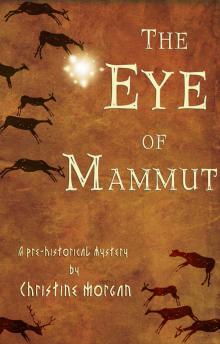 The Eye of Mammut
The Eye of Mammut Megan's Wish
Megan's Wish Endless Miles
Endless Miles For The Best
For The Best Nine Jaguar-Feather
Nine Jaguar-Feather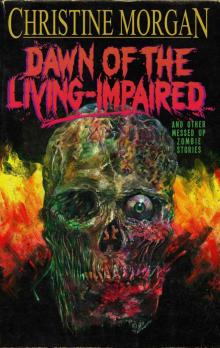 Dawn of the Living-Impaired
Dawn of the Living-Impaired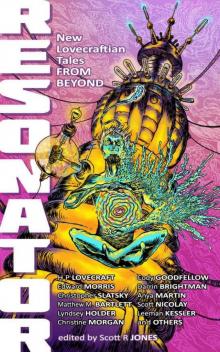 Resonator: New Lovecraftian Tales From Beyond
Resonator: New Lovecraftian Tales From Beyond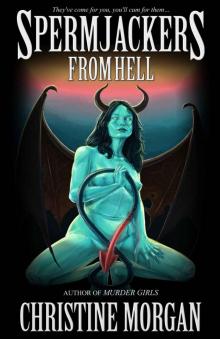 Spermjackers From Hell
Spermjackers From Hell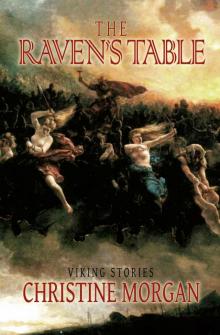 The Raven's Table: Viking Stories
The Raven's Table: Viking Stories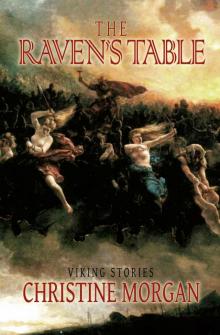 The Raven's Table
The Raven's Table